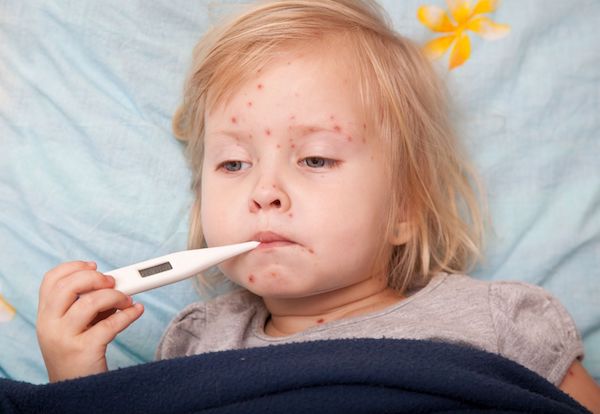Measles is a highly contagious viral infection, common mostly in childhood. It causes a rash all over the body, which is its most characteristic symptom.

It is contagious from about four days before the appearance of the rash until approximately four days after.
Also known as rubeola, measles is one of the leading causes of death in small children as it carries the risk of serious complications like pneumonia and encephalitis. Measles spreads rapidly via a similar mechanism to the flu (via coughing, sneezing, close contact, etc.), but people who have had measles before cannot catch it again.
What are its symptoms?
Measles symptoms usually set in about 10 to 14 days after exposure to the virus and early symptoms may be non-specific symptoms, similar to those of the common cold. Signs may include:
- Fever (which may spike sharply once the rash sets in)
- Runny nose and sneezing
- Sore throat
- Persistent cough
- Red, sore eyes
- Small white spots on the inside of the mouth (these are called Koplik’s spots)
- A rash of small red spots in tight clusters, which sets in several days after the appearance of the other symptoms, usually starting on the face, around the hairline or behind the ears before spreading to the rest of the body.
How is it diagnosed?
A measles diagnosis is usually fairly straightforward thanks to its characteristic blotchy rash and the presence of Koplik’s spots. Your doctor may order a blood test to confirm the diagnosis.
What are your treatment options?
Once the infection has set in, measles treatment is largely about managing the symptoms as there is no known cure. Serious complications can usually be avoided with treatment at home including plenty of bed rest, adequate nutrition and hydration and, if necessary, fever-reducing medication. A doctor may also recommend a vitamin A supplement. If a secondary infection does develop, your doctor will prescribe antibiotics to treat it.
Can it be prevented?
The measles vaccine is the gold standard in measles prevention. In South Africa, the measles vaccine is part of the EPI (Expanded Programme on Immunisation) and is scheduled for babies nine months of age, followed by a booster at 18 months. There’s also an additional vaccination for measles, mumps and rubella (MMR), which can be done at 15 months, with a booster shot at the age of five years old.
In cases where routine immunisation hasn’t taken place, it’s essential to keep infected individuals isolated during the contagious period.
What to do now
Baby immunisations are available at Clicks clinics, including for measles.
To make an appointment at a Clicks Clinic, call 0860 254 257 or visit Clicks Clinics online.
For more info
The National Institute of Communicable Diseases
IMAGE CREDIT: 123rf.com
